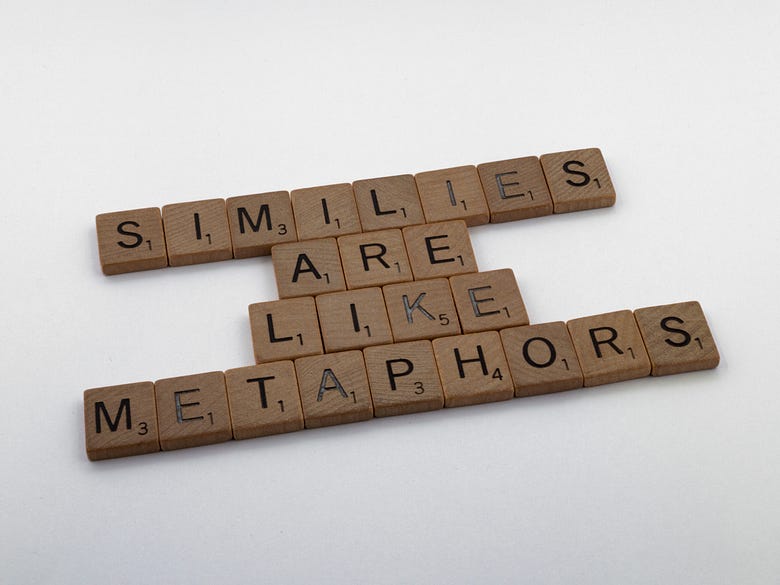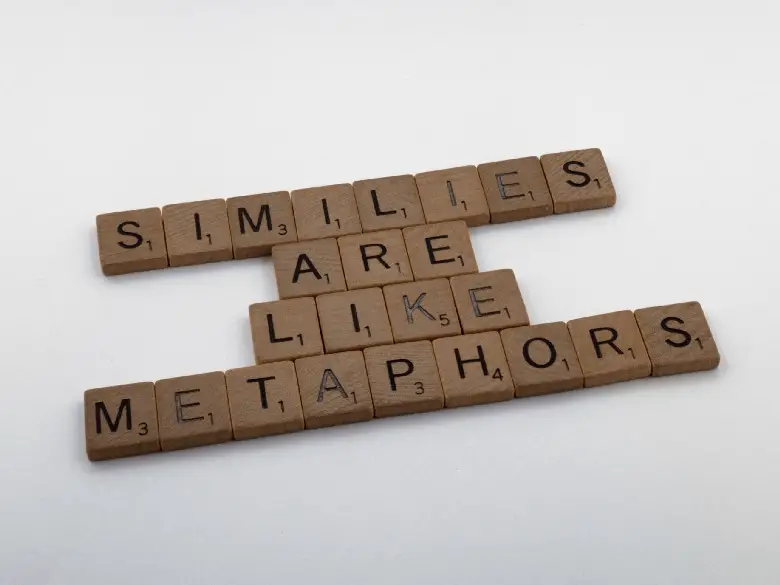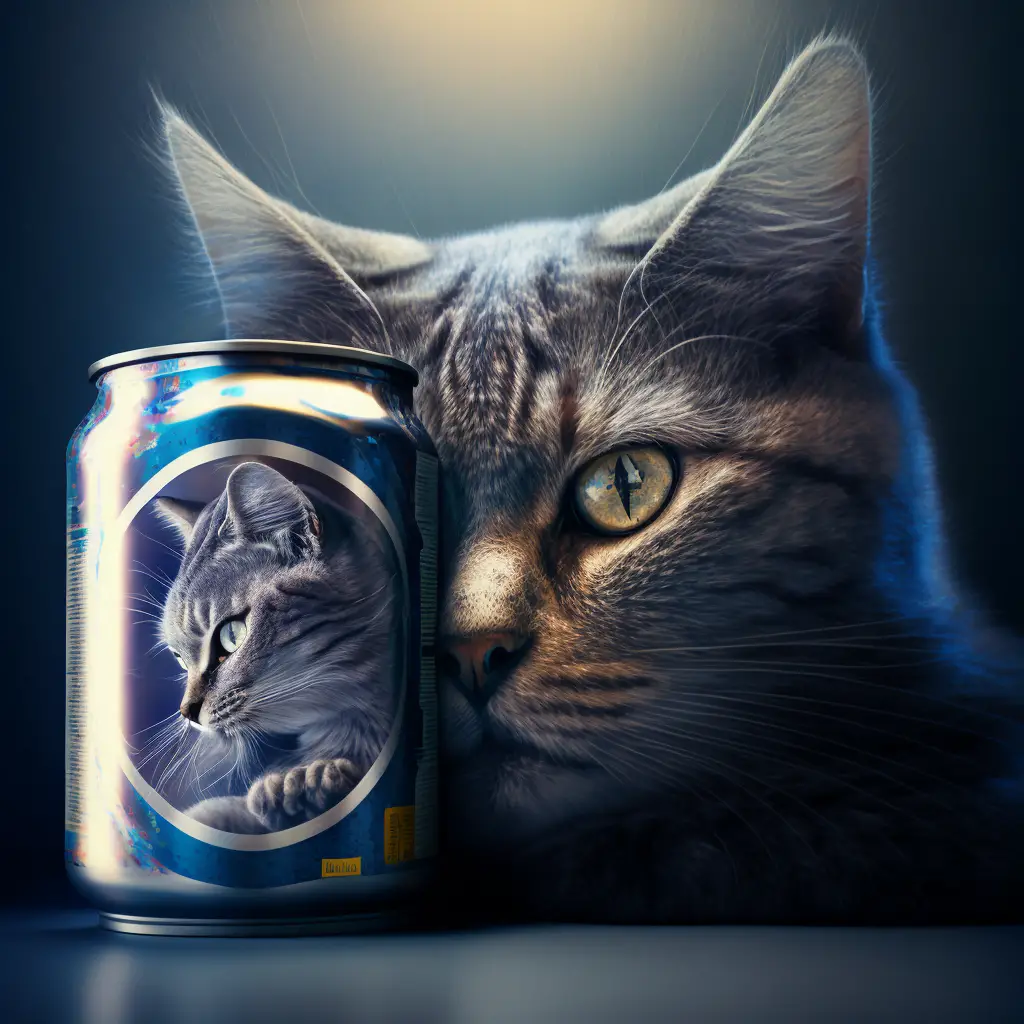
A simile is a figure of speech comparing two things, usually to emphasize or add imagination to a statement.
Ever get bored of reading the dictionary? Or, like an owl trying to read a book during the daytime, did you just fall asleep? Most people don’t make dictionary reading a hobby for a simple reason — the formal language is as dull as a goat eating grass!
And while the above examples of simile probably aren’t going to win me any Pultizer prizes, they did serve the make the opening paragraph a bit less dictionarylike.
And that’s kind of the point of similes. They make language more fun, interesting, and keep our attention far longer than a plain old sentence.
So, let’s take a look at just what similes are, some awesome examples, and how you can make your very own similes for writing, speeches, or even a standup routine.
What is a simile?
You’ve probably heard this in grade school, too, but the most common words used in similes are “as”, “like”, “so”, and “than.” What you might not have heard, depending on your schooling, is that the object being compared is called the “tenor”, and the object being compared to is called the “vehicle.”
The word originally comes from the Latin word “similis”, meaning similar or like.
The word simile is pronounced “si·muh·lee”, also written as “/ˈsɪmɪli/”.
What’s the difference between a simile and a metaphor?
Similes and metaphors are both figures of speech that make a comparison between two things. The main difference is that a simile will say something is “like” something else (or “as”, “so”, “than”), but a metaphor will say something “is” something else.
For example:
- Simile: This article is as great as the constitution!
- Metaphor: This article is the new constitution!
How to create a simile?
While creating similes often gets better with more practice over time, there are a few shortcuts you can use to create some awesome ones in just a few seconds.
#1. Think of the basic premise of sentence
For our example, let’s use:
“The tiger is very strong.”
#2. Now think of something representing the adjective you just used
For this, you can use another object, animal, place, or anything that really strikes out in your mind. One cheat code here is to use Google, where you can search for great analogies to use. Just simply take your adjective and add “est” on the end of it. You can also just search for “a list of very strong things” or something along those lines.
Let’s take the “strong” from the tiger sentence. If I punch “what are the strongest things in the world” into Google, I’ll get options anywhere from diamonds to beetles to bursts of gamma rays.
And since I like the idea of a huge dose of radiation being stronger than an animal’s muscle, we’ll get something like this:
“The tiger was as strong as a massive blast of gamma rays.”
#3. You don’t have to use “as”
If we weren’t quite satisfied with that sentence, we could play around with it using “like”, “so”, or “than”:
- The tiger was like a blast of gamma rays, no one survived its approach.
- A blast of gamma rays is incredibly strong, and so is the tiger.
- The tiger was stronger than a blast of gamma rays when it pounced.
Regardless of which sentence you like (or hate!), the point is to play around, find some more comparisons, and pick the one that you like the most! Then feel free to add some adjectives or adverbs for a little more flavor (like the use of “massive” above).
That’s it!
30 Examples of similes using like, as, so, and than
- She’s as brave as a lion
- He’s as dumb as a doorknob
- He’s as smart as an octopus
- He’s as busy as a bee
- She’s as sweet as honey.
- They’re plumper than a pumpkin.
- She’s as blind as a bat.
- The seat was as cold as ice.
- Her style is as cool as a cucumber.
- His ironed shirt was as fresh as a daisy.
- It’s as fun as watching paint dry.
- It hurts like the devil.
- My stomach is rumbling like a freight train.
- Shine bright like a diamond.
- She hits like a rock.
- It cuts like butter.
- Superman flew like a speeding bullet.
- Life is like a box of chocolates.
- She looks like a fish out of water.
- It tastes like chalk.
- He eats like a pig.
- Bad things can hurt you and so can overpriced coffee.
- Death and taxes are certain, so are you singing in the shower.
- Eternity will stay and so will you, frozen in my mind forever.
- She’s more beautiful than a flower in the morning dew.
- His intellect is more powerful than a supercomputer.
- The cat was furrier than a fat buffalo.
- The sky was darker than a black hole.
- He was funnier than Bill Burr.
- She was cuter than Minnie Mouse.
If you’re thirsty for more writing knowledge, head over here to learn all 74 literary devices.
J.J. Pryor
Head over here for more of my shenanigans.
You might also be interested in learning about Plutchik’s Wheel of Emotions and how it can help your writing.




